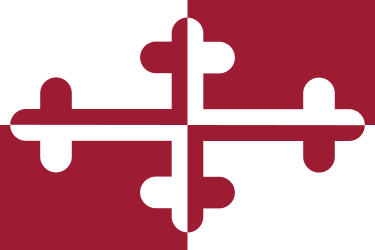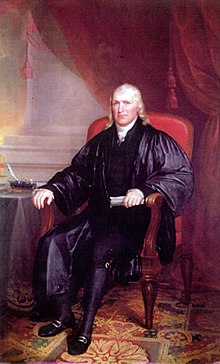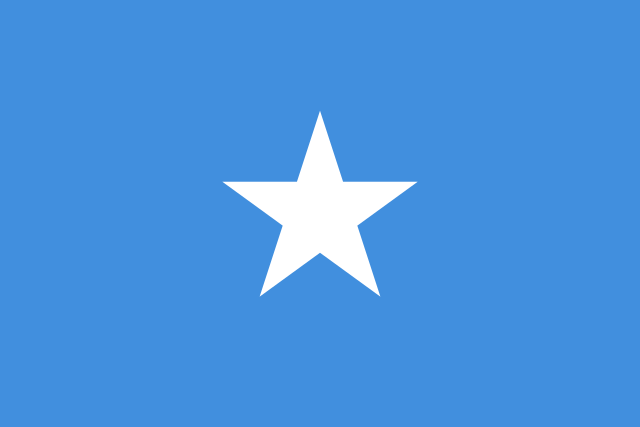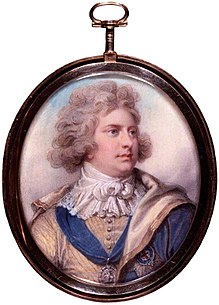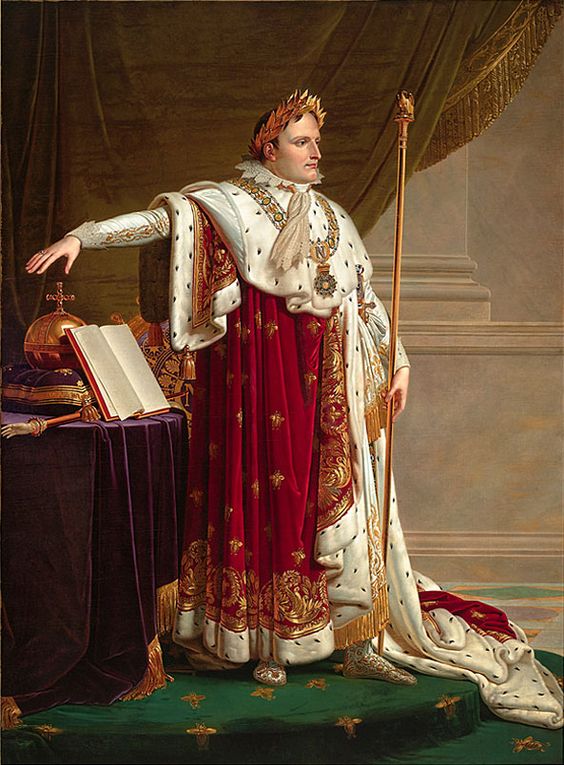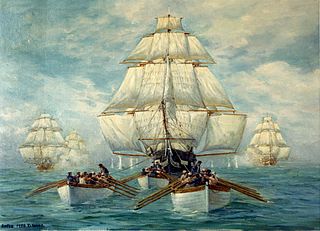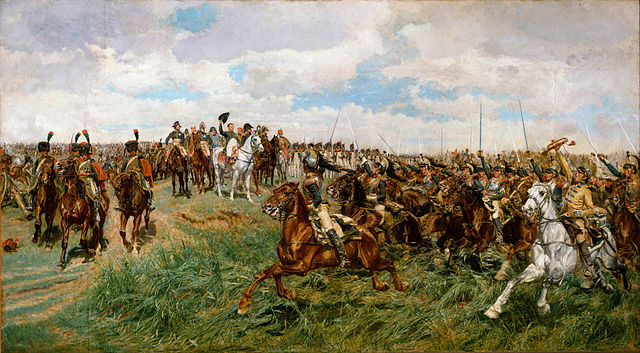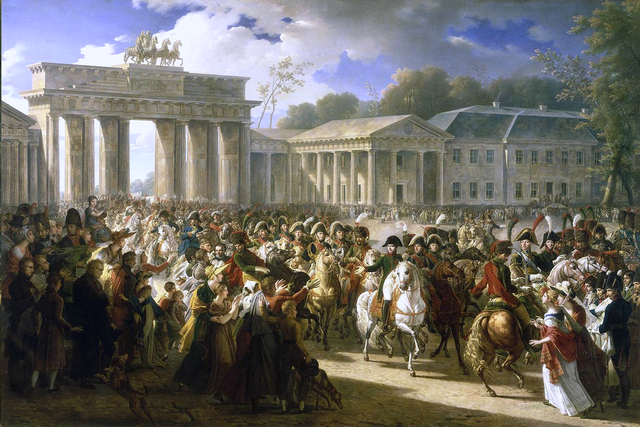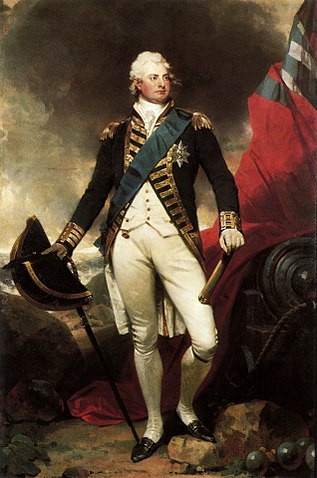CHAPTER 5
THE MADNESS OF THE GEORGES
"The Mad King" George IV
Things had changed across the world since the Fall of the Old United States. Spain, in its war with Britain, had invaded Canadian territory, distracting King George and making him drop plans for possibly reclaiming any old American territories, and giving Napoleon's France a loophole to go on an absolute rampage in Europe.
Napoleon had become the César de la France, the "Caesar of France," in 1804, restoring France to absolute monarchy, and George III finally cracked shortly thereafter. George, overwhelmed with the stress of (as he saw it) increasing losses of the Empire, collapsed in his palace, died, and was replaced with his son George IV. George IV was, unfortunately, completely and utterly bonkers. Not just crazy like his father, but absolutely stark raving, mouth-foaming mad. This was terrible for Britain's wartime morale and the overall leadership of the country. Britain's royal family became a joke internationally, with its own allies mocking it. The Bonaparte family, meanwhile, was doing just fine. Even Prussia came to respect Napoleon more than they did any English royal, even if they hated his Corsican guts for his never-ending territorial ambition.
Napoleon constructed embassies in all the North American countries except West Florida and Vermont. Virginia and Maryland were quite friendly, but it was Georgia that fell in love with the French emperor. The tightening relationship between the two countries improved Georgia's relationship with Spain, since the Spanish were an ally of France. Georgia began to realize that by playing its cards right and by joining Napoleon's alliance, if even unofficially, it could possibly become the dominant independent country in North America. Prime Minister Bulloch thought that sounded great. In the few years since the destruction of the US, the various new countries had started to disdain each other far more, and if he could stick it to "the Northern buzzards" (which now included the Confederation of the Carolinas and Virginia to a lesser extent since further territorial disputes had unfolded in 1802), then it would be a great day in his book. So, in 1806, Georgia began patterning itself after France. French-style uniforms, French music, French food, French everything. It was the beginning of a beautiful friendship that suited Georgia's right-wing militarists just fine.
Meanwhile, in the Republican Union, a new form of government took power: the Consulate, which patterned itself somewhat after Napoleon's France (before he had been crowned Caesar, of course). Instead of just three consuls, like in France, however, there were two for each state elected every four years (titled Consuls of the Republic). There was no president, but two consuls each year were elected as Chief Consuls of the Republic. State or Territorial Consuls (one per state) fulfilled the role of governors. At the capital city, the Republican Consuls would meet and discuss national policy in fair and open debates, debates which often turned ugly or hostile. Willard Crawford had made it clear he would not be a dictator and was surprisingly happy to give up his emergency powers and his Philadelphia Constitutional Convention had been a nominal success, even if the grueling "convention" in Philadelphia lasted three whole years. Three years of the economy being in shambles and the military being non-existent, leaving only the Army of Free Soldiers to keep the nation from anarchy. Democratic-Republicans insisted that freedom be absolutely guaranteed by the government and pushed for the abolition of slavery in all the states of the Republican Union. The new party, the Centrist Party, largely made up of politicians from the smaller or less-populous states, demanded a moderate, populist government. They also pushed for a large army to be raised to defend the country from Britain, Spain, and its southern neighbors.
The long-lasting raging hatred that the North would eventually have for the South was not quite in full swing. The Southerners disdained the north and blamed the horrific failure of the United States on them. The North was more concerned in its own problems and was content for the moment to push their "hillbilly cousins" onto the back burner for now. Slavery was a rather touchy subject, though, and any suggestions by consuls for closer relationships with the "Southron" republics were usually shot down by fire-and-brimstone New England abolitionists (or those pretending abolitionists to score political points). Many present historians now claim that without slavery-or if the North had had many themselves-the USA might have recovered after the Treason Trials, but the increasingly foreign cultures developing between the former British colonies was largely unavoidable, and it was a miracle they hadn't had a seaboard-spanning civil war under the shaky Articles of Confederation. Given a few decades at most, and the USA would have likely sank into some sort of civil war. The withdrawal of the South had come at just the right time to avoid entering that likely self-destructive conflict.
Back in the North, there were some Union citizens, though, that began thinking of the Southern republics as "rightful Union land." The captain of this philosophical ship was Aaron Burr, the middle-aged Consul of New York. He served with Willard Crawford as the first two Chief Consuls, and during that time made his revanchist feelings known. While military force was not taken seriously at this point to force the Southerners back under the North's wing, Burr's way of thinking set the stage for further problems.
Aaron Burr
List of Consuls of the Republic (1801-1805):
- Willard Crawford - New Hampshire
- William Whipple - New Hampshire
- George Clinton - New York
- George Clymer - Pennsylvania
- William Jackson - Pennsylvania
- Joseph Bloomfield - New Jersey
- William Livingstone - New Jersey
- Gunning Bedford, Jr. - Delaware
- Richard Basset - Delaware
- John Samuel Peters - Connecticut
- Oliver Wolcott, Jr. - Connecticut
- James Fenner - Rhode Island
- Nehemiah Knight - Rhode Island
The year 1807 was an utter disaster for Britain's efforts against Napoleon. King George IV had become so hopelessly insane that he was frequently beaten into unconsciousness by palace guards for his own safety. He cooked an entire cat alive in the royal stove after chasing out the chefs and maids from the kitchen. It was an expensive breed belonging to his brother Frederick. It was also William's favorite palace pet. This did not bode well with Fred or Wills. From that point on, they both went into attack mode, constantly begging the government for permission to rip away their crazed brother's crown.
This, of course, did not bode well with Georgy. Not at all. He went into a deep, dark depression, where he locked himself in his room for hours, weeping bitterly and talking to imaginary friends. When servants would unlock the door, he'd beat them off with a fireplace poker and scream seemingly random verses from the Bible. He finally lost every trace of sanity on December 21, 1807. The madness was about to consume Britain.
It started like every other terrible day in wartime London, and George had locked himself away again. The servants were told to ignore him, for something big was supposed to happen later in the afternoon. That big thing was Frederick was to become Regent. Stability would be returned. The Corsican Ogre would be beaten back and his empire would be destroyed. The Americans would be kept in check. "The British Empire will return to glory and march onward to future triumphs, the likes of which the world has never seen," said William.
On that day, at 10 AM, ten palace guards, a group of servants, Frederick, and William marched to George's room to evict him and put him in a "safe room," much like the one that had held his father during his manic final days. When they opened the door and delivered the news, George was uncommonly quiet and at peace. He said there would be "no need for a guarded escort."
Frederick smiled sadly and asked, "You'll cooperate, then? That is most admirable of you, my brother. Father would be proud of you. This is not something we wish to have happened, but it's necessary for the Empire. We know you do your best but we need a firm hand to deal with those frogs, eh? We love you, George."
To which George responded: "No. There will be no need for an escort, because it ends now." Everyone's smiles vanished instantly. "This is my castle! My
donjon! My
château!
My citadel of Merlin! And you shall not take it from me,
damn you! You're all going to die for plotting against your God-given monarch!" What followed was one of the most gruesome setbacks in English history. George pulled out two flintlock pistols from his large red coat. He then shot Frederick directly in the chest, killing him almost instantly. He fired the other and struck William in the side as William attempted to catch Frederick as he fell, sending blood spurting everywhere and both princes crashing backward over a coffee table. George then pulled a decorative sword off the wall of the room, raised it to his own neck, and then slit his own throat. The blade almost severed his head as he fell forward. He let out a few final gurgles and breathed his last.
The guards and servants stood in horror at the bloodbath for a few seconds, in a state of shock, before going to work trying to revive Frederick. It was no use. He was as dead as George, and the prince's body lay in a pool of his own blood. William, meanwhile, was put on a stretcher and raced to another room where a veritable army of doctors raced to remove the bullet from his lower ribcage. He was losing a lot of blood, and for several hours the entire palace stood on edge, waiting to see if three rightful monarchs would die in one day. Fortunately, William stabilized and survived. The British propaganda industry had its work cut out for itself. There was simply no way of getting around what had happened. George IV, King of Great Britain, had murdered one of his own brothers and gravely wounded the other before taking his own life. What was there to lie about? What was there to fictionalize for the sake of national morale? The answer was nothing at all.
Portrait of King George IV done shortly before his suicide
Britain's stock market crumbled and the nation was rocked by a devastating combination of mourning and economic depression. As if that wasn't bad enough, Russia and France signed a formal alliance against Great Britain and launched a worldwide propaganda campaign ridiculing the English aristocracy with zingers like
"King George was ill-bred and he was touched in the head. King George filled his brothers with lead, before he cut off his own head. His head! His head! His head!" This rhyme grew so popular that the French Grand Army sang it to the tun of "
Marlbrough s'en va-t-en guerre." It later became even more widespread among the Russians, who sang it to various folk tunes. It eventually made its way to North America, where the southern countries adapted it to the tune of
We are a Band of Brothers.
This is widely considered the turning point in the Napoleonic Wars that sealed France's fate as a world power.

